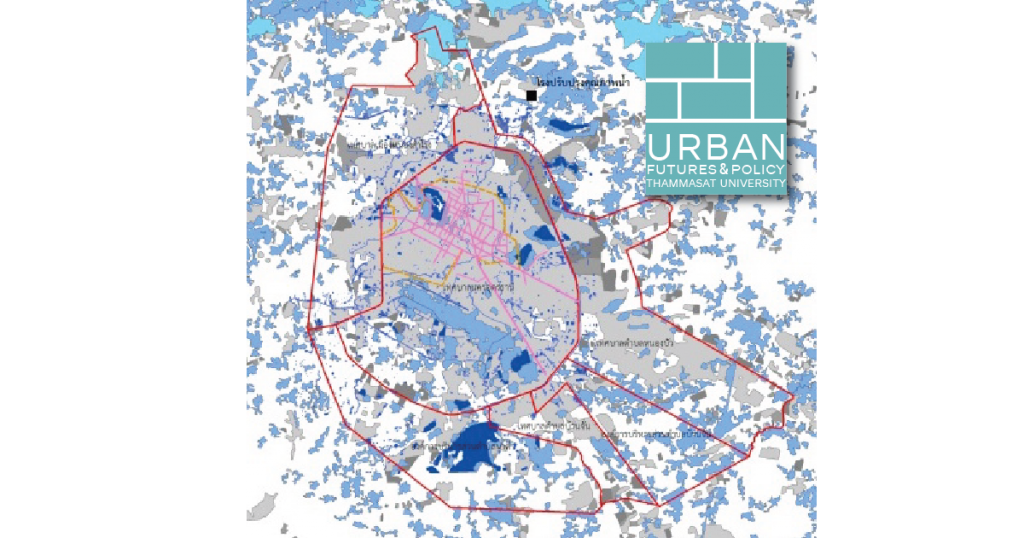urban resilience
Spatial and socioeconomic risk assessment of flooding in Udonthani Nakorn Municipality and outlying municipalities and Tambon administrative organization
year 2014-2016
โครงการการประเมินความเสี่ยงของพื้นที่และระบบเศรษฐกิจสังคม
ของเขตเทศบาลนครอุดรธานีและเทศบาลและ อบต.โดยรอบต่อภาวะนํ้าท่วม
ของเขตเทศบาลนครอุดรธานีและเทศบาลและ อบต.โดยรอบต่อภาวะนํ้าท่วม
พ.ศ.2557-2559
Share on facebook
Facebook
Share on google
Google+
Share on twitter
Twitter
Share on linkedin
LinkedIn
Share on whatsapp
WhatsApp

(สำหรับภาษาไทยกรุณาเลื่อนลง)
Extreme weather events affect vulnerable urban areas adversely, with substantial damage, disruption of normal economic and social activities and services and loss of human life and can also alter the medium or long-term development trajectory of the cities.
Thus, disaster management is an important context for integrating adaptation into decision-making for the cities at risk. The APN funded research project in Mumbai, Bangkok and Manila has been undertaken with the primary objective of identifying and measuring the short to medium-term impacts and responses to extreme weather events and their policy implications for long-term adaptation capacity and development planning for the cities.
The project includes analysis of primary and secondary data to measure the physical, economic and social losses in the case study cities. We also examine the short to medium term responses from the local government and citizens and evaluate if they enhance the adaptation capacity of the cities to cope with future weather events and flood risks.
This analysis has policy implications for disaster management, city resilience and adaptive capacity of the cities in the longterm. The project is particularly relevant to the selected cities belonging to the developing world where natural disasters have long-term implications for development and poverty alleviation.
Urban Futures involved in the second research’s objective of the institutional gap analysis of urban state agencies and governance in order to understand challenges for building urban climate resiliency. The research undertakes a case study of the limitations to urban climate resilience of the city region of Udon Thani province in Thailand which is rapidly growing and aims to become a regional hub despite being confronted with climate-related challenges. The research focuses on examining plans and policies at national, regional and local levels regarding the provincial development strategy, land use, water supply, and wastewater management services in order to examine the vertical and horizontal institutional arrangement, legal framework, policy drivers, and other limitations to the mainstreaming of climate resilience into urban development planning. Interviews and workshops were also held with relevant public officials and practitioners.
The findings reveal that there are limitations caused by institutional arrangements and gaps which have resulted in the lack of coordination between agencies at different levels or administration or agencies operating under different ministries. There are also discrepancies of responsibility and information and financial resources which significantly undermine the efficiency of the three urban services, and, consequently, Udon Thani city region’s climate resilience and ability to accommodate spatial and socio-economic growth.
(ฉบับภาษาไทย)
ในปี 2558 ประเทศไทยจะเป็นส่วนหนึ่งของประชาคมเศรษฐกิจอาเซียน (AEC : ASEAN Economic Community)จังหวัดอุดรธานีซึ่งเป็นหนึ่งในเมืองสำคัญทางเศรษฐกิจและสังคมในภาคตะวันออกเฉียงเหนือจึงมีวิสัยทัศน์ที่จะเป็นศูนย์กลางโลจิสติกส์ (Logistics) ของภูมิภาคและอาเซียนด้วยหากแต่ว่าอุดรธานียังมีปัญหาที่อาจจะเป็นอุปสรรคในการพัฒนาของจังหวัดซึ่งเกิดจากปัจจัยทั้งภายนอกและภายใน
ปัจจัยภายนอก ได้แก่ การเปลี่ยนแปลงภูมิอากาศซึ่งประกอบด้วยปัญหาภัยแล้งและภัยน้ำท่วม โดยเฉพาะในพื้นที่อำเภอเมืองซึ่งทำให้อุดรธานีมีปัญหาในการจัดการน้ำเพื่อใช้สำหรับภาคการเกษตรในจังหวัดและการใช้น้ำสำหรับภาคครัวเรือนและภาคการผลิตในพื้นที่เมืองอีกประการหนึ่งคือ ปัจจัยภายในซึ่งประกอบด้วยการขยายตัวของพื้นที่เมืองและจำนวนประชากรซึ่งการขยายตัวนี้ยังอาจส่งผลให้ภัยแล้งและภัยน้ำท่วมมีความรุนแรงมากยิ่งขึ้น ผลกระทบของภาวะน้ำท่วมในความรุนแรงต่างๆ ต่อเมืองมีรูปแบบและขนาดแตกต่างกัน การวิเคราะห์ความเสี่ยงของเมืองจากภาวะน้ำท่วมนั้นจึงจำเป็นต้องศึกษาความเสี่ยงจากปัจจัยกายภาพและการพัฒนาเมืองด้านเศรษฐกิจและสังคม นอกจากนั้น การขยายตัวของพื้นที่เมืองและความเสี่ยงที่เกิดขึ้นจากภาวะน้ำท่วม ยังเกินขอบเขตพื้นที่การบริหารจัดการขององค์กรปกครองท้องถิ่นเพียงหน่วยงานเดียว การดำเนินการเพื่อรับมือกับอุปสรรคดังกล่าวยังไม่สามารถดำเนินการได้อย่างเป็นรูปธรรมเนื่องจากในปัจจุบันมีช่องว่างของกลไกสถาบันที่มีผลต่อการดำเนินการเพื่อรับมือกับความเสี่ยงของเมือง ตลอดจนท้องถิ่นและภาครัฐยังขาดเอกภาพในการรับมือกับภาวะเสี่ยงทำให้องค์กรปกครองส่วนท้องถิ่นที่มีอิทธิพลต่อการตัดสินใจในพื้นที่ศึกษาไม่สามารถสนองตอบต่อการปรับตัวและรับมือกับการเปลี่ยนแปลงดังกล่าวได้อย่างมีประสิทธิภาพและประสิทธิผล การตั้งรับปรับตัวกับผลกระทบจากการเปลี่ยนแปลงภูมิอากาศจึงได้นำมาซึ่งการวิเคราะห์ช่องว่างของกลไกสถาบัน เพื่อความเป็นเอกภาพและลดช่องว่างของกลไกสถาบันในการวางแผนและดำเนินการเพื่อบริหารจัดการความเสี่ยงในอนาคต
เพื่อสร้างความเข้าใจในพลวัตของปัจจัยต่างๆที่อาจส่งผลต่อการพัฒนาของเทศบาลนครอุดรธานีและพื้นที่เทศบาลและ อบต.โดยรอบ โครงการวิจัยนี้จึงมีวัตถุประสงค์หลัก 2 ประการ คือ
(1) วิเคราะห์ปัจจัยและขนาดความเสี่ยงของเมือง (Urban Risk Assessment)ในเขตเทศบาลนครอุดรธานีและพื้นที่เทศบาลและ อบต.ข้างเคียง โดยมีกรอบการศึกษาในห้วงอดีตถึงปัจจุบันย้อนหลังไป 10 ปี เพื่อให้สามารถเข้าใจถึงรูปแบบและระดับความเสี่ยงที่แตกต่างกันในบริบทของการเปลี่ยนแปลงภูมิอากาศและบริบทของพลวัตเมือง (Urban Dynamic)ในด้านกายภาพและเศรษฐกิจสังคม
(2) วิเคราะห์ช่องว่างของกลไกสถาบัน (Institutional Mechanism) ของการวางแผนและจัดทำผังเมืองและนโยบายอื่นๆ ที่เกี่ยวข้อง เพื่อวิเคราะห์ประสิทธิภาพ/ประสิทธิผลของแนวทางการรับมือกับภาวะเสี่ยงทางด้านกายภาพและทางด้านเศรษฐกิจและสังคมของเทศบาลนครอุดรธานีและองค์กรปกครองท้องถิ่นที่เกี่ยวข้องที่มีผลต่อการดำเนินการเพื่อรับมือกับความเสี่ยงและการเติบโตของเมืองให้มีความยั่งยืนต่อภาวะเสี่ยงจากสภาพอากาศรุนแรง (Resilience)เพื่อบริหารจัดการความเสี่ยงเหล่านั้น
Research Team
Asst. Prof. Nij Tontisirin (ผศ.ดร. นิจ ตันติศิรินทร์)
Faculty of Architecture and Planning, Thammasat University
Assoc.Prof. Wijitbusaba Marome (รศ.ดร.วิจิตรบุษบา มารมย์)
Faculty of Architecture and Planning, Thammasat University
Asst.Prof. Sutee Anantsuksomsri (ผศ.ดร. สุธี อนันต์สุขสมศรี)
Faculty of Architecture, Chulalongkorn University
